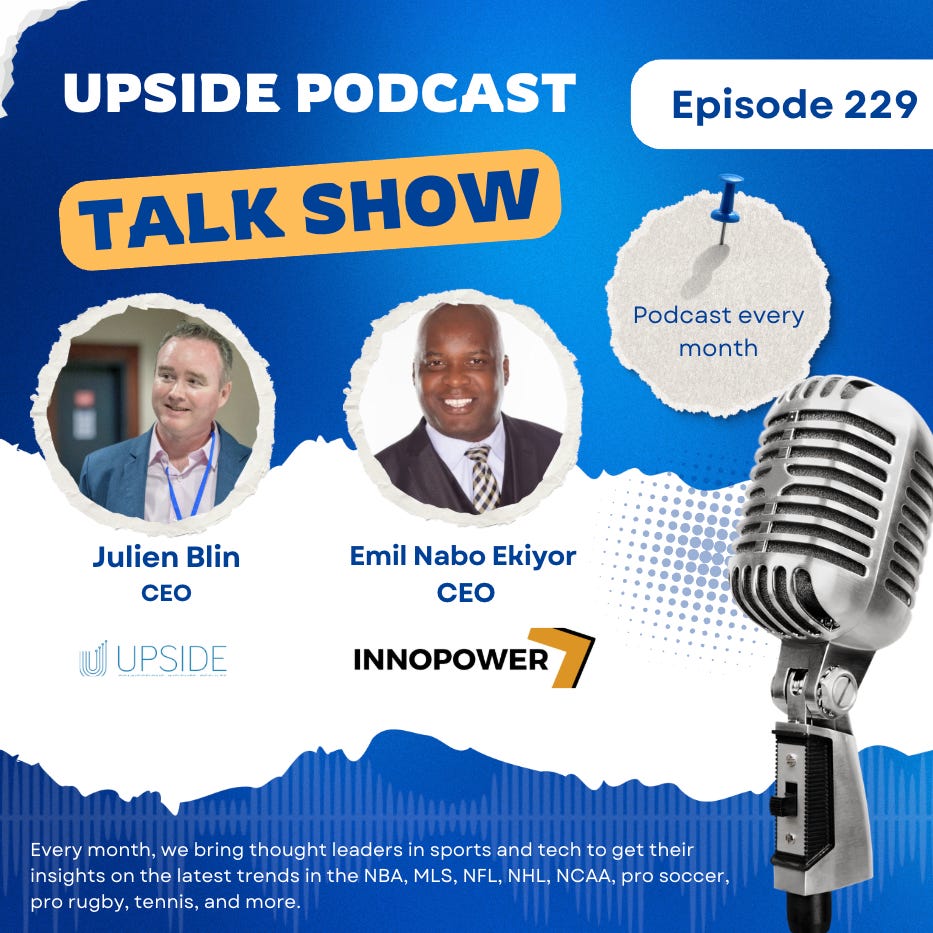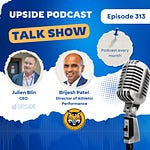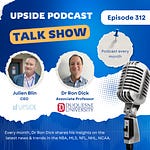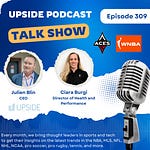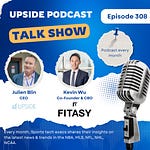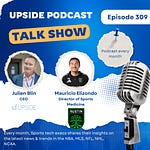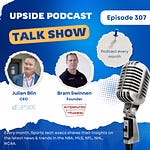This week we had the honor to interview InnoPower CEO and former NFL player, Emil Nagbo Ikior. InnoPower is a venture-driven organization focused on fostering innovation and entrepreneurship in underserved communities in the U.S. and emerging markets in Africa. Born in Lagos, Nigeria, Ekiyor moved to the United States at 15 to pursue educational opportunities, eventually earning a football scholarship to the University of Central Florida. Despite only playing the sport for a short time, his athleticism and dedication led him to a career in the NFL, where he played for teams like the Tampa Bay Buccaneers, Oakland Raiders, and Atlanta Falcons.
Pictures: Emil Nabo Ekiyor
Following his time in professional football, Ekiyor transitioned into entrepreneurship and economic development, recognizing the power of innovation to drive social and economic change. Through InnoPower, he has built a robust ecosystem that identifies and supports high-potential founders, particularly in Black communities and African markets, by providing mentorship, funding, and strategic partnerships. His work bridges the gap between opportunity and execution, leveraging his experience in sports, business, and global development to empower the next generation of entrepreneurs.
You can read the full transcript of the podcast interview with Emil located at the top of this blog post.
Here are the best quotes from our conversation with Emil:
Q1. Could you start by telling us about your background and your role at InnoPower?
“I was born in Lagos, Nigeria, and grew up in a family with seven sisters and two brothers. My ethnic group, the Ijaw, is the fourth largest in Nigeria. I grew up in the Delta region, which is the heart of Nigeria’s oil industry. My family was middle class, but my parents always emphasized education. When I was 15, they sent me to the U.S. for better opportunities, and I moved to Daytona Beach, Florida, to live with a host family.”
“When I arrived in the U.S., I was just excited to be here. I had this mindset of ‘just get me there, and in 10 years, I’ll be sending for everybody.’ But one of the first things that struck me was how many people who looked like me didn’t have that same excitement about opportunity. It made me realize that the way I had been raised in Nigeria—with a deep belief in creating my own opportunities—was different.”
“I played soccer growing up and planned to continue playing in high school, but since soccer was during the same season as football, I gave football a try in my junior year. At first, I had no idea what I was doing—I didn’t even know how to put on pads. But I was tall, athletic, and could run and jump, so I stuck with it. By my senior year, I had developed enough to earn a scholarship to the University of Central Florida. And just six years after leaving Nigeria, I found myself in the NFL.”
“That experience taught me a lot about the power of infrastructure. The NFL has an incredible talent development pipeline that can take someone like me—who had never played before—and, if they have the right traits and work ethic, develop them into a professional athlete. That’s something I carry into my work today with InnoPower. It’s all about creating opportunities through the right infrastructure and support systems.”
Q2. Can you tell us about InnoPower?
“InnoPower is built on a simple but powerful idea—innovation is the key to creating new opportunities and transforming communities. Instead of just running programs, we take a market-based approach, helping people build businesses that create wealth and long-term solutions.”
“I saw firsthand how innovation changed Nigeria. When I left, only about 20% of homes had landlines. But when I returned years later, over 80% of people had cell phones. Nigeria had skipped an entire phase of development—going straight from no phones to mobile technology. That made me realize how powerful innovation can be in accelerating progress.”
“In the U.S., I noticed that Black communities in Tampa, Atlanta, and Oakland all faced the same challenges. And it made me ask: How can we create a better system that allows people in these communities to succeed? That’s what InnoPower is about—helping entrepreneurs not just start businesses but grow them into something sustainable.”
Q3. Can you tell us about some success stories of where you took young, talented entrepreneurs and helped them succeed?
“One of the startups we’re working with right now is Java 365, founded by Yemi, a Nigerian entrepreneur who worked at Microsoft for years. She saw a major issue—Office 365 costs the same in Nigeria as it does in the U.S., making it too expensive for most businesses. Because of that, most Nigerian companies rely on the free version of Gmail. Yemi built Java 365, a version of Office 365 with all the same tools—email, video calls, collaboration features—but at a price point that’s accessible to the African market, just $3 a month.”
“Java 365 is growing rapidly, and we’re helping Yemi scale it by supporting her as a leader, connecting her with investors, and helping her navigate both the U.S. and African markets. That’s the kind of founder we love—someone who sees a real problem and builds a solution that creates access for millions of people.”
“Another great example is Pay For Me App, a platform that allows people in Sub-Saharan Africa to make payments in the U.S. If you want to apply to an American university, pay school fees, or even buy a Netflix subscription, it’s incredibly difficult without a U.S. bank account. This founder built an app that solves that problem, allowing people to transact globally without relying on outdated banking systems.”
Q4. When you're looking to invest in companies, talent, or new technology, what are the most important criteria?
“The first thing we look for is whether the company is solving a real, large-scale problem. For example, in the U.S., there are 50 million African Americans. If you create a product that meets an unmet need in that community, you have 50 million potential customers. Many founders don’t think about markets in this way, and we help them see that.”
“The same principle applies in Africa, but at an even larger scale. If you develop a product that addresses a fundamental challenge—whether in agriculture, fintech, renewable energy, or education—you have millions of potential customers waiting for a better solution.”
“We also ask: Is this built on an emerging trend? If we’re investing in technology, we want to make sure it’s not yesterday’s technology—it needs to be something that will continue to grow in relevance, like AI, fintech, or digital infrastructure.”
“Another key factor is the founder’s ability to execute. Some of the most talented founders struggle not because their idea is bad, but because they don’t have the right network. They may lack access to advisors, customers, or investors. That’s where we come in—helping them build capacity, connect with the right people, and accelerate their growth.”
“And to be clear, we don’t just invest in people from certain backgrounds. If you grew up in Montana and built an incredible product for emerging markets, we’d be interested. The key question is: Does it solve a problem, and do you understand the market?”
Q5. Why do you think Indy is such a great place for sports tech startups right now?
“Indianapolis is a sports city through and through. You’ve got the Colts, Pacers, the Indy 500, the NCAA headquarters, and major college sports programs like Notre Dame, IU, and Purdue all within a short drive. There’s always something happening in sports here, which makes it a great environment for sports tech companies.”
“Sports tech is all about enhancing the athlete experience—whether it’s performance, recovery, or preparation. Indy has the perfect setting for testing and refining these technologies because of the constant influx of elite athletes.”
“The venture scene in Indy is also thriving. You’ve got Elevate Ventures—one of the most active VC firms in the country—High Alpha, and a new venture studio at Purdue. There’s funding, talent, and infrastructure all coming together.”
“We call Indy ‘Speed City’ because things move fast here. If you’re a founder looking to build something in sports tech, come visit. We have space at Elevate Ventures specifically for founders to spend a few days in the middle of the action, meet investors, and see firsthand why Indy is a great place to grow a business.”
You may also like:


